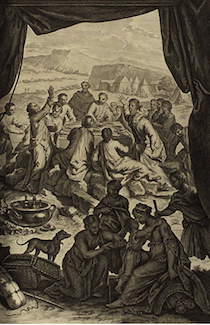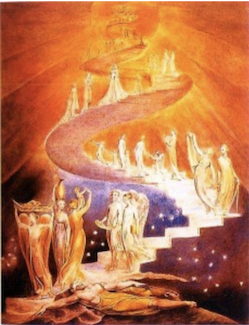Vayetzei
By Rabbi Gideon D Sylvester
ISRAEL AND HER ENEMIES

“Ultimately, Jacob defends himself against Esau and Laban. He makes treaties with each of them, they learn to live side by side and they go their separate ways.”
By the time that you read this, calm has been restored. Meanwhile, at the time of writing, Israel was once again at war, making it an appropriate time to reflect on the Torah’s attitude to enemies and conflict.
On Seder night, we interrupt our narrative of the exodus from Egypt to tell the story of a villain who was worse than Pharaoh.
Come and learn what Laban the Aramean tried to do to our father Jacob. While Pharaoh only made his decrees against the males, Laban tried to uproot us all. For so it is written “A Syrian sought to destroy my father and he went down to Egypt and dwelled there, few in number. There he became a nation, great, mighty and numerous.” (Passover Haggadah)
This idea is based on a verse in this week’s sedra. Jacob has been repeatedly cheated by his Uncle Laban. Now he and his family pack up their belongings and leave. Laban gives chase, accuses Jacob of stealing the idols and leaving without a proper farewell for Laban and his daughters. Then, he says;
It is within the power of my hand to do you harm, but the God of your fathers said to me last night as follows:
“Take heed that you do not speak either good or bad to Jacob”. (Genesis 31: 29)

Jacob and Laban make covenant. ©Wikipedia
According to the rabbis, Laban was threatening genocide.
The Haggada retells these events because like the exodus, it matches in miniature the God’s prophecy to Abraham at the Covenant of the Pieces,
“Know for certain that for four hundred years your descendants will be strangers in a strange land and that they will be enslaved and mistreated there. But I will punish the nation they serve as slaves, and afterward they will come out with great wealth. (Genesis 15: 13-14)
Jacob, a single, penniless refugee flees to Laban’s house where he is tricked and persecuted, but eventually escapes with his large family and great wealth.
The Mahari Beyrav argues that there is another connection. He blames Laban for our eventual slavery and suffering in Egypt. Had Laban not switched Rachel for Leah underneath Jacob’s wedding canopy, Joseph would have been the first-born, the brothers would have respected his position, there would have been a calm and happiness in Jacob’s home, Joseph would not have been sold to Potiphar and the Jewish people would not have been enslaved in Egypt.
Sometimes, the smallest sin can have enormous consequences, leading to terrible suffering. Others focus less on what Laban did and more on his motives. We have no idea why Laban hated Jacob so much. This is what makes him such a dastardly enemy. We can understand why Esau resented Jacob taking his blessing and the enmity that caused and we can understand the Egyptian desire to have slaves, but Laban had no reason to hate Jacob, to continually cheat him and to attempt to take his life when we face implacable enemies, peace seems very far off. (Rashbatz)
"As Jacob left his family home, he dreamt a beautiful, spiritual dream of angels ascending and descending a ladder from the heavens"

Jacob's Ladder by William Blake (c. 1800, British Museum, London)
Finally, we recall Rabbi Shlomo Riskin’s explanation that as Jacob left his family home, he dreamt a beautiful, spiritual dream of angels ascending and descending a ladder from the heavens. But after years of living with the greedy, materialistic Laban, his idealism was waning; by the time the angel commands Jacob to make his way back home, he is dreaming of speckled sheep and profit margins.
Ultimately, Jacob defends himself against Esau and Laban. He makes treaties with each of them, they learn to live side by side and they go their separate ways.
Most important of all, as Rabbi Riskin points out, Jacob also recovers his sense of mission. For whilst defending the citizens of Israel is a non-negotiable, we must always be vigilant to guard our stunning Jewish vision of a world at peace where
“They shall beat their swords into plowshares, and their spears into pruning hooks; nation shall not lift up sword against nation, neither shall they learn war anymore.” (Isaiah 2: 4)
Vayetzei offers an eternal lesson for the Jewish people. The dreams of the Land of Israel are noble dreams, exalted dreams, and dreams which ultimately connect us to Heaven.The dreams of our national youth, the visions of our Biblical heroes, and of the Patriarchs and Matriarchs, can only be achieved in the Land of Israel. Indeed, the dreams of Israel ideally connect all of the Earth's inhabitants to their Father in Heaven. Rabbi Dr. Tzvi Hersh Weinreb
We can revisit the dreams of our youth. We can go home again. The Land of Israel is the land of our dreams and it is our eternal home.
Recommended:
SHABBAT TZION
Celebrate your connection to Israel through Torah and Shabbat today!
About the Author









